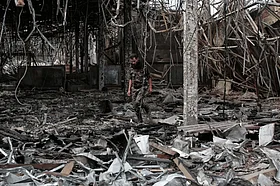Escalation in the Red Sea: A Series of Attacks Spark Global Concern
The Red Sea has become a focal point of international concern following a series of attacks on commercial vessels within a 24-hour period. These incidents have raised alarms about the resurgence of Houthi aggression, particularly in one of the world’s most critical maritime trade routes. The situation is compounded by heightened tensions in the Middle East and fragile ceasefire talks in Qatar.
First Attack: A Liberian Bulk Carrier Targeted
On Monday, a Liberia-flagged bulk carrier was attacked while sailing northbound near Hodeida on Yemen’s western coast. According to reports from the UK maritime security firm Ambrey, the vessel came under fire from two small skiffs and multiple unmanned aerial vehicles (UAVs). The attackers opened fire, leading the ship’s onboard Armed Security Team (AST) to respond. Two crew members were injured, and two others remain unaccounted for.
The UK Maritime Trade Operations (UKMTO) confirmed receiving reports of the incident approximately 51 nautical miles west of Hodeida. This marks the second attack in just one day, highlighting the growing threat to commercial shipping in the region.
Second Attack: The “Magic Seas” Vessel Sunk
Earlier on Sunday, Yemen’s Iran-aligned Houthi militants claimed responsibility for an attack on the “Magic Seas,” a commercial vessel traveling through the Red Sea. This marked the first Houthi attack on commercial shipping on the vital maritime route this year. In May, the militants had agreed to a ceasefire with Washington that ended weeks of intense US strikes.
According to Houthi military spokesperson Yahya Saree, gunmen on skiffs fired rocket-propelled grenades and other weapons at the ship, eventually forcing the crew to abandon it. Saree claimed the vessel was hit by five ballistic and cruise missiles, three drones, and two unmanned boats, stating that the ship was “completely sunk.” He described the ship as a “legitimate target” due to alleged ties to Israeli ports.
Retaliation and Escalation
In response to the attack, the Israeli military launched a wave of airstrikes targeting key Houthi infrastructure, including the ports of Hodeida, Ras Isa, and Salif, as well as the captured Galaxy Leader cargo ship. Israeli officials stated that the Galaxy Leader had been equipped with radar systems to monitor Red Sea traffic.
Shortly after Israel’s strikes, the Houthis launched missiles toward Israeli territory. According to the Israeli army, two projectiles were fired from Yemen. Saree later claimed responsibility, stating that Ben Gurion Airport, the ports of Ashdod and Eilat, and a power station in Ashkelon were targeted in direct response to what he called “Israeli aggression.”
Broader Regional Implications
These attacks come at a time when ceasefire negotiations in the Israel-Gaza conflict remain precarious. Talks are ongoing in Doha, and the situation is further complicated by recent developments involving Iran, a key Houthi ally. Just weeks ago, US strikes reportedly damaged sensitive nuclear sites in Iran, adding another layer of complexity to the already volatile regional landscape.
The repeated attacks on commercial vessels in the Red Sea underscore the urgent need for international cooperation and dialogue to de-escalate tensions. As the situation continues to evolve, the global community remains watchful, aware that any further escalation could have far-reaching consequences for both regional stability and global trade.







